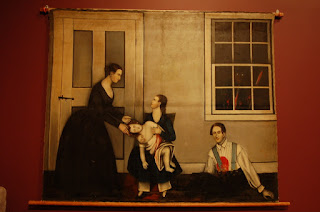AN OPEN FIELD FORLORN
“He [Freeman] come under my charge in Nov. 1841. I soon discovered he didn’t do quite as much work as he ought to. I told him he was capable of doing as much work as other men of his size and experience, and he must do a reasonable day’s work, and if he did not I should punish him. I talked to him at different times, about two months after he came in. Finding that talking did not have the desired effect, I called him up to flog him. Sometimes he said he did all he could, and sometimes he said he was sent there wrongfully. He may have made other excuses.
I called him up and told him I had done talking to him; and I was going to punish him. I told him to take his clothes off. I turned to get the cat, and received a blow on the back part of the head from him. It started me a little. As I looked around, Bill struck me on the back. I kicked at him, and knocked him partly over; perhaps he fell clear down. He jumped up, went across the shop, took up a knife and came at me. I took up a piece of board lying on the desk, went down and met him. It was a basswood board, two feet long, fourteen inches wide, and half inch thick. It was a board one of the convicts had laid on my desk, on which was a count of lumber, planed on both sides. When I came in reach of him, I struck him on the head, flat-wise; split the board, and left a piece in my hand four inches wide. He then approached me with a knife. I struck him on the wrist and knocked the knife out of his hand. I struck him five or six times across the buttocks with the board. I punished him and sent him to his work. I had no further difficulty with him. I struck no other blow on the head. I think the blow could not have hurt him. My impression is that the blow was on his forehead, but may have been partly on the left side. He worked well after that.”- Capt. James E. Tyler (keeper) Report from the Trial of William Freeman 1845
Eating utensils, like reading and writing materials, were restricted at Auburn. Inmates often ate with their fingers off tin plates, or directly out of slop buckets. The contradiction of this policy of keeping forks and knives out of inmates’ hands, in a prison comprised of workshops where every sharp tool imaginable was accessible, was all too apparent. All these shop tools could easily be turned into weapons. Why not have a fork and knife? A cornucopia of construction materials and tools awaited the idle fingers of the increasingly bored keepers and inmate. This made for an interesting playground for both penitent and guard. One was only limited by one’s imagination in regard to how to create wild inventions to administer punishment and save your tired arm from flogging, or kill a man the next cell over. The more creative carpenters and blacksmiths (inside and out) brought their work home with them. Carnage predictably followed.
Eclipsing even the tortures, the overarching mandate for Auburn was silence. It was religiously maintained. Congregate work and solitary confinement was punctuated by corporal punishment for the smallest infraction of the silence policy. An atmosphere of overarching terror prevailed. Any noise or deviation from routine was met with immediate and extreme measures. Usually flogging was deterrent enough to cajole the offending inmate back in line. But tough, career criminals like Austin Reed knew how to subvert the system by gritting themselves and “taking it like a man,” earning them credibility among the inmates, and hatred from the guards. After a while flogging had no effect on these hard cases. Industrious officers prided themselves in their ability to stay one step ahead of the toughest inmate, constantly inventing new atrocities to break the proud malcontents. Every keeper liked a challenge.
Five years had finally passed for Bill Freeman. He was released on Sept. 20, 1845, (the same day Calico Indian Cornelius Osterhout was on trial for murder and kidnapping in Delhi, prosecuted by now New York Atty. Gen. John Van Buren). Also on that day, the administration at Auburn was busy with another mess. An inmate by the name of Henry Wyatt had just killed another convict by the name of James Gordon, with a pair of tailor’s scissors. His subsequent murder trial would bring John Van Buren from Delhi to Auburn.
Now flogged raw in the box, after killing James Gordon, Henry Wyatt joined Austin Reed, “bucked across a barrel” in the bowels of Auburn; both within sight of each other in the ill lit dungeon. Neither had much to say.
William Freeman, now deaf, most likely brain damaged, yet able to function on a primary level, drink, feed himself, do simple tasks, stepped from the back door of Auburn Prison and squinted in the September sunlight. When casually asked by a passerby, “What do you know?” he said he knew one thing—that he’d done five years in the state prison for stealing a horse he didn’t steal—and someone was going to pay for it.

Comments
Post a Comment